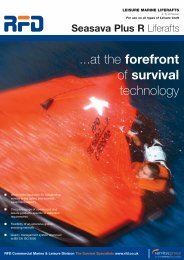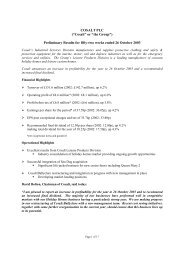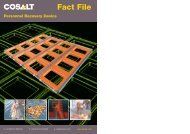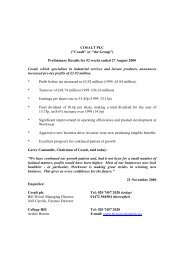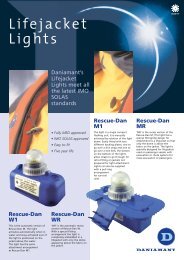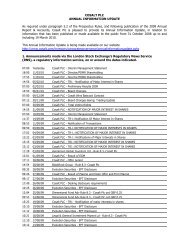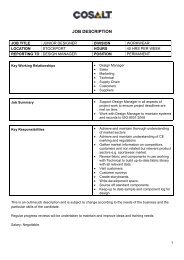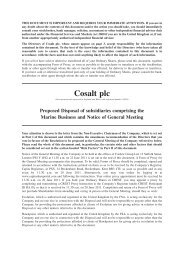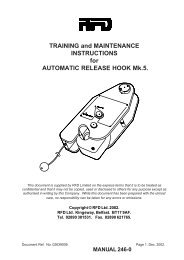Cosalt plc Annual report & financial statements 2008
Cosalt plc Annual report & financial statements 2008
Cosalt plc Annual report & financial statements 2008
You also want an ePaper? Increase the reach of your titles
YUMPU automatically turns print PDFs into web optimized ePapers that Google loves.
Financial <strong>statements</strong><br />
Notes to the <strong>financial</strong> <strong>statements</strong><br />
continued<br />
50 <strong>Cosalt</strong> <strong>plc</strong> <strong>Annual</strong> <strong>report</strong> & <strong>financial</strong> <strong>statements</strong> <strong>2008</strong><br />
Notes to the <strong>financial</strong> <strong>statements</strong><br />
q Provisions<br />
Provisions are recognised when the Group has a present obligation as a result of a past event, and it is probable that the Group will<br />
be required to settle that obligation. Provisions are measured at the Directors’ best estimate of the expenditure required to settle the<br />
obligation at the balance sheet date, and are discounted to present value where the effect is material.<br />
r Discontinued operations<br />
Discontinued operations are separate major lines of business that have been disposed of or classified as held for sale.<br />
s Inventories<br />
Inventories are stated at the lower of cost including an appropriate proportion of production overheads and net realisable values.<br />
t Long-term contracts<br />
The amount of profit attributable to the stage of completion of a long-term contract is recognised when the outcome of the contract<br />
can be foreseen with reasonable certainty. Turnover for such contracts is stated appropriate to the stage of completion plus<br />
attributable profits, less amounts recognised in previous years. Provision is made for any losses as soon as they are foreseen.<br />
Contract work in progress is stated at costs incurred, less those transferred to the profit and loss account, after deducting<br />
foreseeable losses and payments on account not matched with turnover.<br />
Amounts recoverable on contracts are included in debtors and represent turnover recognised in excess of payments on account.<br />
u Government grants<br />
Capital grants received for additions to buildings and plant are taken to deferred income and are released to the income statement<br />
in instalments relating to the relevant asset lives.<br />
Other grants are recognised in the profit and loss account in the same period as the related expenditure.<br />
v Revenue recognition<br />
Revenue from the sale of goods is recognised in the income statement when the significant risks and rewards of ownership have<br />
been transferred to the buyer.<br />
Revenue from services rendered is recognised in the income statement in proportion to the stage of completion of the transaction<br />
at the balance sheet date. The stage of completion is assessed by reference to review of work completed.<br />
No revenue is recognised if there are significant uncertainties regarding recovery of the consideration due, associated costs for<br />
the possible return of goods, or if there is continuing managerial involvement with goods.<br />
w New standards and interpretations not applied<br />
The Directors have considered new standards and interpretations issued by the IASB and IFRIC, with effective dates after the<br />
date of these <strong>financial</strong> <strong>statements</strong>. The Directors do not anticipate that adoption of these standards will have a material impact<br />
on the Group.<br />
The main standards to be applied in future are as follows:<br />
• IFRIC 14 – The Limit on a Defined Benefit Asset, Minimum Funding Requirements and their Interaction clarifies when refunds or<br />
reductions in future contributions in relation to defined benefit assets should be regarded as available and provides guidance on<br />
the impact of minimum funding requirements (MFR) on such assets. It also addresses when a MFR might give rise to a liability.<br />
IFRIC will become mandatory for the Group’s 2009 <strong>financial</strong> <strong>statements</strong> with retrospective application required. The Group does<br />
not expect this to impact on the <strong>financial</strong> <strong>statements</strong>.<br />
The following Adopted IFRSs were available for early application but have not been applied by the Group in these <strong>financial</strong><br />
<strong>statements</strong>. Their adoption is not expected to have a material affect on the <strong>financial</strong> <strong>statements</strong> except for additional disclosure:<br />
• Revised IAS 23 ‘Borrowing Costs’ (mandatory for the year commencing on or after 1 January 2009).<br />
• Revised IAS 1 ‘Presentation of Financial Statements’ (mandatory for the year commencing on or after 1 January 2009).<br />
• Revised IAS 27 ‘Consolidated and Separate Financial Statements’ (mandatory for the year commencing on or after 1 July 2009).<br />
• Amendments to IFRS 2 ‘Share based payment – Vesting Conditions and Cancellations’ (mandatory for the year commencing<br />
on or after 1 January 2009).<br />
• IFRS 8 Operating Segments (Applicable for periods beginning on or after 1 January 2009).



